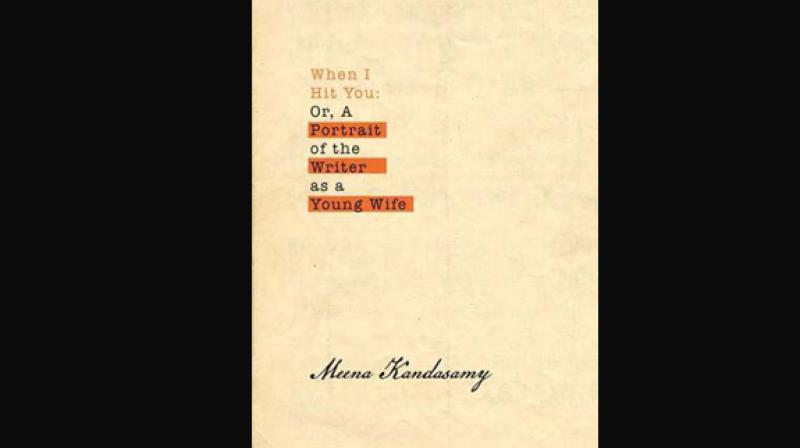Book review: Brilliant self portrait makes a bold narrative
The power of brevity and silent intonation of these words, as Meena chronicles them in that order, speak for themselves.

Chennai: "Words allow me escape. Words give birth to another woman." This is how the wounded soul in the poet, fiction writer translator and activist, Meena Kandasamy reaffirms her spirit as a writer. Her latest book offering, "When I Hit You: Or, A Portrait of the Writer as a Young Wife', metaphorically invokes the image of the pen as a weapon, and she being Kandasamy, named after one of the most popular Tamil Gods Murugan (Murugu in Tamil etymologically refers to 'beauty'), the 'weapon' that the South Indian psyche instantly associates with is 'Vel (Spear)'.
But this brilliantly written self-portrait in a span of about 250 pages is a bold narrative not just about playing back the unnerving inconsistencies of 'dialectical logic' to diehard Marxists-turned-Maoists to show at least one thing has no 'material basis'.
The work of Meena Kandasamy, who now divides her time between Chennai and London, is no doubt informed by that powerfully dissenting undertone, to even critique one of the greatest intellectuals in the Marxist tradition, the French Marxist philosopher Louis Perris Althuseer's rationalization of administering 'suicide-by-proxy' to his wife; yet, this made her afraid she might land up like Althusser's wife herself, leave alone a lone wreck.
This was after the writer's marriage to a college lecturer flaming with idealism and 'revolutionary' fervour, in a college in what is now Mangaluru, bizarrely turns into a theatre of abuse and violence, a crushing of her individual freedom and will to write, eventually forcing her to walk out of it in an act of self-emancipation as it were, as quickly as she had got into the wedlock with the ex-Maoist.
If proper names had just mythico-theological connation alone, the writer might have even curbed her 'victimhood', like limited demonetization, and generously pigeonholed her abuser-husband with words of 'Forgive them, Father, for they know not what they do."
But the intent of plunging into this portrait is not to reduce him to "the sum total of all the evil things in the world." "No, I never said that," the author protests in a conversation to the husband of her Tamil friend "almost a year after I walked away from the marriage."
This narrative, strung around her broken marriage, dovetailing in it the evolution of a young mind through the portals of higher education, the people she comes across and unfolding the diverse 'flavours' of youth's fascination for ideal-heroes, particularly in politics, the disappointment, pain, agony and fleeting moments of ecstasy, before someone came into 'marry' her only to dub all these as petty bourgeoisie lifestyle, has for the writer a much larger canvas of social anthropology and responsible action.
More so for Meena Kandasamy, hailing from a Tamil middle class family, wherein her father had a salaried job and votes DMK, while her mother, amid all the insults inflicted on her daughter, never gives up hope of tradition delivering peace, harmony and purpose.
This larger teleology, Meena Kandasamy hints, in such evocative words with a touch of philosophical profundity: "I might have moved from Mangalore, from the marriage, but I realize that I cannot get away from abuse. To save face, and in the hope of justice, I turn over the corpse of my marriage to the police. I meet lawyers, I pay consultation fees with a writer's unsteady, meagre income." …."I realize that penance does not finish with the act of nailing myself to a cross. To suffer for the sins of this world, there is much more to be endured." That's what makes a writer to move on.
"All that I need, I carry with me in a shoulder bag. Passport. ATM card. Laptop. My phone that he never let me use. All of this is mine…..I call home. I tell my mother I'm coming to her. Bruised but alive. The moon is on my back. The auto-rickshaw races into the night. I shed this miserable city like a second skin." The power of brevity and silent intonation of these words, as Meena chronicles them in that order, speak for themselves.
Comrades always take proud that "criticism is part of the Marxist dialectical method", but in trying to lift women's consciousness out of the mess of the institution of marriage, out of small-town India's mindset, as she indicates, Meena Kandasamy also takes recourse to cultural symbols like 'red dot' to pay them back in their own coin.
Stylistically, the author climbs a new peak in the modernist tradition of what is termed stream-of-consciousness-writing, as exemplified in the section that contains a string of 'Letter to a Lover' - in fact several of them, speaking candidly on a whole range of issues from the tenderness of a very human emotion, irony of erotic treatises to the subtleties of linguistics, post-structuralism and so on.
Call it chance or circumstance, this modernist style, which traces its roots to the Irish writer James Joyce's first novel, 'A Portrait of the Artist as a Young Man", first published in 1916, now prides itself of a 100-year timeline, an apt moment for a centenarian tribute in the larger world of literary creativity.
Nonetheless, for Meena Kandasamy, her intense portrait with such effortless burst of words and pithy phrases, often like missiles, is not about feminist assertion. Hear out her own words, which yearns for a new ontology of true human love that respects and cares for human beings: "I am the woman who asked for tenderness and got raped in return. I am the woman who has done her sentence. I am the woman who still believes, broken-heartedly in love." Truly, Meena Kandasamy "hits" us all, right, left and centre.

